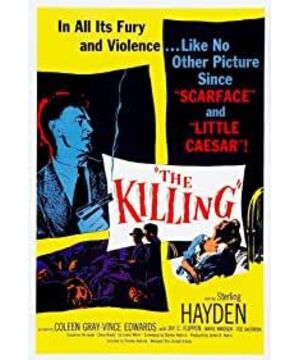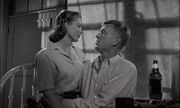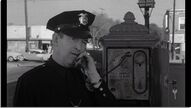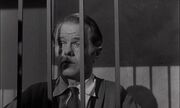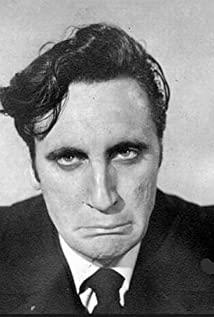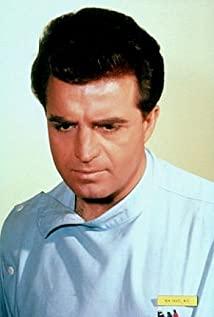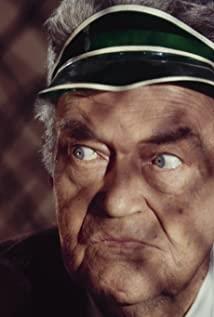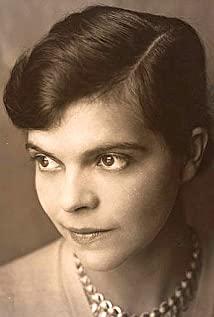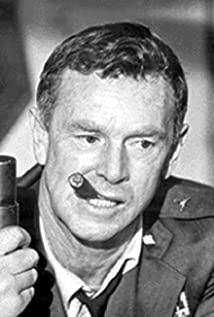Made at the age of 28, Kubrick's third feature, is indubitably, his very first masterpiece. THE KILLING is a taut heist movie told in a refreshing non-linear narrative, souped up with a crispy pace and pristine economy and pulsating along with its solemn but efficacious incidental music.
The ringleader is Johnny Clay (Hayden), an old lag fresh out of the jug, schemes a 2-million heist in the racetrack as his last hurrah before getting married with his sweetheart Fay (Coleen Gray, a girl of every man's dream, as she confesses: she is not very pretty, not very clever, but faithful). The cohort includes several other members, a debt-ridden cop Randy Kennan (de Corsia), a track bartender Mike (Sawyer) and Marvin Unger (Flippen), a liaison and a father figure to Johnny among others. But there is always a monkey wrench in the works as ominousness is palpably hovering in the air, whom most people might pigeonhole Sherry Peatty (Windsor) in this slot, a paragon femme fatale, two -times her hubby George (Cook Jr.), a betting window teller in the loop, with a younger criminal Val (Vince Edwards, the Italian stud). Nevertheless for my money,the seemingly harmless George is more answerable to the cluster-fuck than her because it is his fatal predisposition to Sherry's none-too-subtle manipulation, which imperils the whole act in the first place. Driven by the deepest guilt of his impotence (both physically and pecuniarily), he is too blind to see through Sherry's tactless subterfuge, and what adds insult to injury is when Sherry fiendishly trumps up a final blow (with allusion of being ravished) to pulverize his piteous, vestigial pride, in a word, he only has himself to blame and he should have known better.Driven by the deepest guilt of his impotence (both physically and pecuniarily), he is too blind to see through Sherry's tactless subterfuge, and what adds insult to injury is when Sherry fiendishly trumps up a final blow (with allusion of being ravished) to pulverize his piteous, vestigial pride, in a word, he only has himself to blame and he should have known better.Driven by the deepest guilt of his impotence (both physically and pecuniarily), he is too blind to see through Sherry's tactless subterfuge, and what adds insult to injury is when Sherry fiendishly trumps up a final blow (with allusion of being ravished) to pulverize his piteous, vestigial pride, in a word, he only has himself to blame and he should have known better.
The scheme is told through various individuals involved dutifully perform their respective task, but jumping back and forth in the timeline, a ploy of Kubrick to engage viewers and trust us to piece together the jigsaw through their actions, but a dumbing-down counterpoise operated by the studio, which interpolates a voiceover narrated by Art Gilmore, dwelling upon the minutiae to our assistance, effectively renders the plot more intelligible and lucid, but significantly undercuts Kubrick's artistic integrity. Elsewhere, the film bears cordial testimony of a young Kubrick's astute vision and genius of deploying the exterior mise-en-scène to gorgeous effects (eg the minute racetrack sequences),fomenting the thrills and spills in the daredevil plan (a racially heightened encounter recoils with fatal irony) and ramming home its nihilistic finale with a terse retort to the damn kismet (not a canine lover, sir?), and to say nothing of the zippy horse-racing scenes being observed by DPLucien Ballard's unrelenting camera.
A top-form ensemble lead by a straight-up Sterling Hayden, who is almost too upstanding to be a law-breaker, just looking at how he confidently ropes a Russian heavy (Kola Kwariani, a real-life wrestler) and a dead-eye (Timothy Carey) into the game in two separate occasions, and buys them off doing what is exactly on his say-so without further interference of the bigger plan, there is a sympathetic coolness oozing from his mien which potentially glamorizes the con-manship. Elisa Cook Jr. and Marie Windsor play off each other in this crass-versus-callousgame of delusion with flying colors, and Jay C. Flippen dishes out a flicker of deeply-felt communion in his lesser familiar avuncular turn which betrays a scintilla of tenderness in this otherwise seminally hard-boiled, pyrotechnic showpiece of an indomitable wunderkind.
referential points: Quentin Tarantino's RESEVOIR DOGS (1992, 7.7/10); Kubrick's KILLER'S KISS (1955, 5.2/10); Orson Welles TOUCH OF EVIL (1958, 8.0/10; Jean-Pierre Melville's LE SAMOURAI (1967, 8.5/10) ).
View more about The Killing reviews


